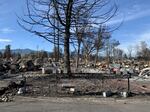The Rogue Valley was already in a housing crunch when the Almeda Fire hit. Eighteen mobile home parks were largely or fully destroyed, burning 1,500 to 1,700 manufactured homes and RVs, according to state Rep. Pam Marsh of Ashland.
“These parks are essential to the naturally occurring affordable housing that’s so essential in our communities,” Marsh said in a community forum she hosted Wednesday. The event brought together local and state housing groups to connect displaced residents with resources.
“Stick homes are where we’re seeing recovery happen,” Marsh said. “Where we have not seen a rebound yet is in the manufactured home sector.”

Mailboxes at the manufactured home park Royal Oaks Mobile Manor after the Almeda Fire.
Erik Neumann / JPR News
The forum ranged from financing for fire victims to replace manufactured homes and options for evacuees to buy FEMA trailers they’re living in, as well as grants for fire-resistant construction materials and energy efficiency incentives in new homes.
Jackson County and the state of Oregon are also partnering on the development of a new state-funded mobile home park, with 140 modular units, to maintain affordability for tenants at a time when their costs are sure to increase at newly restored mobile home parks.
“What we are going to be doing is financing the acquisition of new land or the acquisition of existing parks for renovation,” said Ryan Flynn with Oregon Housing and Community Services.
The program is funded as part of a $150 million investment in post-fire housing from the state legislature.
The Jackson County non-profit ACCESS and their Center for Community Resilience is serving as the repository for manufactured housing resources and will help fire victims navigate programs.
But despite many residents still displaced from the fires, Marsh says, it’s an open question whether private owners will preserve this affordable housing or develop the land into something more lucrative.

